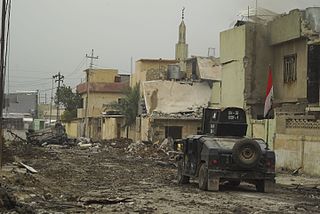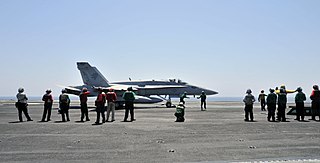
The 2003 invasion of Iraq was the first stage of the Iraq War. The invasion began on 20 March 2003 and lasted just over one month, including 26 days of major combat operations, in which a United States-led combined force of troops from the United States, the United Kingdom, Australia and Poland invaded the Republic of Iraq. Twenty-two days after the first day of the invasion, the capital city of Baghdad was captured by coalition forces on 9 April after the six-day-long Battle of Baghdad. This early stage of the war formally ended on 1 May when U.S. President George W. Bush declared the "end of major combat operations" in his Mission Accomplished speech, after which the Coalition Provisional Authority (CPA) was established as the first of several successive transitional governments leading up to the first Iraqi parliamentary election in January 2005. U.S. military forces later remained in Iraq until the withdrawal in 2011.

The Peshmerga are the internal security forces of Kurdistan Region. According to the Constitution of Iraq, regional governments are responsible for "the establishment and organization of the internal security forces for the region such as police, security forces, and guards of the region". Other Kurdish security agencies include the Zêrevanî (gendarmerie), Asayish, and the Parastin û Zanyarî. The Peshmerga's history dates back to the 18th century, when they began as a tribal paramilitary border guard under the Ottoman Turks and the Safavid kurds. By the 19th century, they had evolved into a disciplined and well-trained guerrilla force.
The Battle of Debecka Pass on 6–7 April 2003, sometimes known as the Battle of Debecka Ridge or Debecka Crossroads, or otherwise referred to as the Alamo of the Iraq War, was a successful operation launched by U.S. Special Forces to secure a major crossroads near the village of Debecka, between Mosul and Kirkuk in northern Iraq. It was notable for its use of the Raytheon/Lockheed-Martin Javelin anti-tank missile. The weapon demonstrated how lethal and crucial technology can be in determining the outcome of a battle. The light unarmored SOF and Peshmerga (KDP) force faced a mechanized force of Iraqi infantry and tanks. The US and KPD force was able to defeat the Iraqi mechanized infantry & tank force with combined air-to-ground strikes, superior maneuvering, and the use of the Javelin missiles.

The Battle of Mosul was fought during the Iraq War in 2004 for the capital of the Ninawa Governorate in northern Iraq that occurred concurrently to fighting in Fallujah.
The 2008 Nineveh campaign was a series of offensives and counter-attacks between insurgent and Coalition forces for control of the Nineveh Governorate in northern Iraq in early-to-mid-2008. Some fighting also occurred in the neighboring Kirkuk Governorate.

The 2nd Division was a formation of the Iraqi Army. It was theoretically headquartered at Mosul, but was driven out of that city by IS. No reliable reports of its continued existence have surfaced since June–July 2014. Previously, the 2nd Division was one of the most experienced formations in the Iraqi Army.

The War in Iraq (2013–2017) was an armed conflict between Iraq and its allies and the Islamic State. Following December 2013, the insurgency escalated into full-scale guerrilla warfare following clashes in the cities of Ramadi and Fallujah in parts of western Iraq, and culminated in the Islamic State offensive into Iraq in June 2014, which lead to the capture of the cities of Mosul, Tikrit and other cities in western and northern Iraq by the Islamic State. Between 4–9 June 2014, the city of Mosul was attacked and later fell; following this, Prime Minister Nouri al-Maliki called for a national state of emergency on 10 June. However, despite the security crisis, Iraq's parliament did not allow Maliki to declare a state of emergency; many legislators boycotted the session because they opposed expanding the prime minister's powers. Ali Ghaidan, a former military commander in Mosul, accused al-Maliki of being the one who issued the order to withdraw from the city of Mosul. At its height, ISIL held 56,000 square kilometers of Iraqi territory, containing 4.5 million citizens.
Between 1 and 15 August 2014, the Islamic State of Iraq and the Levant (ISIL) expanded territory in northern Iraq under their control. In the region north and west from Mosul, the Islamic State conquered Zumar, Sinjar, Wana, Mosul Dam, Qaraqosh, Tel Keppe, Batnaya and Kocho, and in the region south and east of Mosul the towns Bakhdida, Karamlish, Bartella and Makhmour

The Battle for Mosul Dam took place in August 2014 between militants of the Islamic State of Iraq and the Levant (ISIL) and Iraqi Special Operations Forces and Kurdish Peshmerga, supported by U.S.-led Coalition airstrikes.

On 15 June 2014 U.S. President Barack Obama ordered United States forces to be dispatched in response to the Northern Iraq offensive of the Islamic State (IS), as part of Operation Inherent Resolve. At the invitation of the Iraqi government, American troops went to assess Iraqi forces and the threat posed by ISIL.

On 3 October 2014, Canadian Prime Minister Stephen Harper announced that he would put forth a motion to send forces to participate in the coalition for military intervention against ISIL by deploying combat aircraft. On 7 October 2014, the House of Commons approved of sending nine aircraft to join coalition airstrikes against ISIL in Iraq along with 69 special forces advisors to train the Iraqi government's military. The Canadian Armed Forces' contribution to the coalition against ISIL was later dubbed Operation IMPACT. On 30 March 2015, the House of Commons voted to extend the mission to targets in Syria. No additional forces were announced.

The Sinjar offensive was a combination of operations of Kurdish Peshmerga, PKK and People's Protection Units forces in December 2014, to recapture regions formerly lost to the Islamic State of Iraq and the Levant in their August offensive.
The Peshmerga have historically been Kurdish guerrilla forces combating the ruling powers in the region of what is now Iraqi Kurdistan. The term "Peshmerga" refers to those who face death, and the forces have long been an essential element in the Kurdish fight for autonomy and recognition.

The Mosul offensive (2015) was an offensive launched by Kurdish Peshmerga forces on 21 January 2015, with the objective of severing key ISIL supply routes to Mosul, Iraq, and to recapture neighboring areas around Mosul. The effort was supported by US-led coalition airstrikes. The Iraqi Army was widely expected to launch the planned operation to retake the actual city of Mosul in the Spring of 2015, but the offensive was postponed to October 2016, after Ramadi fell to ISIL in May 2015.

The November Sinjar offensive was a combination of operations of Kurdish Peshmerga, PKK, and Yezidi Kurd militias in November 2015, to recapture the city of Sinjar from the Islamic State of Iraq and the Levant. It resulted in a decisive victory for the Kurdish forces, who expelled the ISIL militants from Sinjar and regained control of Highway 47, which until then had served as the major supply route between the ISIL strongholds of Raqqa and Mosul.
The Nineveh Plains offensive was a battle in which the Islamic State of Iraq and the Levant (ISIL) mounted a multi-front attack against Peshmerga forces in the area north and east of Mosul, in December 2015. The attack—the most significant ISIL military operation in the area in months, was successfully repelled by the Kurdish forces and was followed by a coalition air counter-offensive.

The Shirqat offensive, codenamed Operation Conquest or Operation Fatah, was an offensive against the positions of the Islamic State of Iraq and the Levant (ISIL) in and around the district of Al-Shirqat District to reach the city of Mosul.

The Battle of Mosul was a major battle initiated by the Iraqi Government forces with allied forces to retake the city of Mosul from the Islamic State (ISIL), which had seized the city years prior in June 2014. It was the largest conventional land battle since the capture of Baghdad in 2003. It was also the world's single largest military operation overall since the 2003 invasion of Iraq and was considered the toughest urban battle since World War II.
The following is a timeline of the Battle of Mosul (2016–17) between October and December 2016.
The Battle of Ain Sifni was a tactical engagement that took place during the 2003 Invasion of Iraq, involving U.S. Special Forces and Kurdish Peshmerga fighters against Iraqi forces. Though it was a smaller engagement compared to other battles in the region, the battle was significant due to the strategic importance of Ain Sifni, which served as a route to Mosul from the north.












